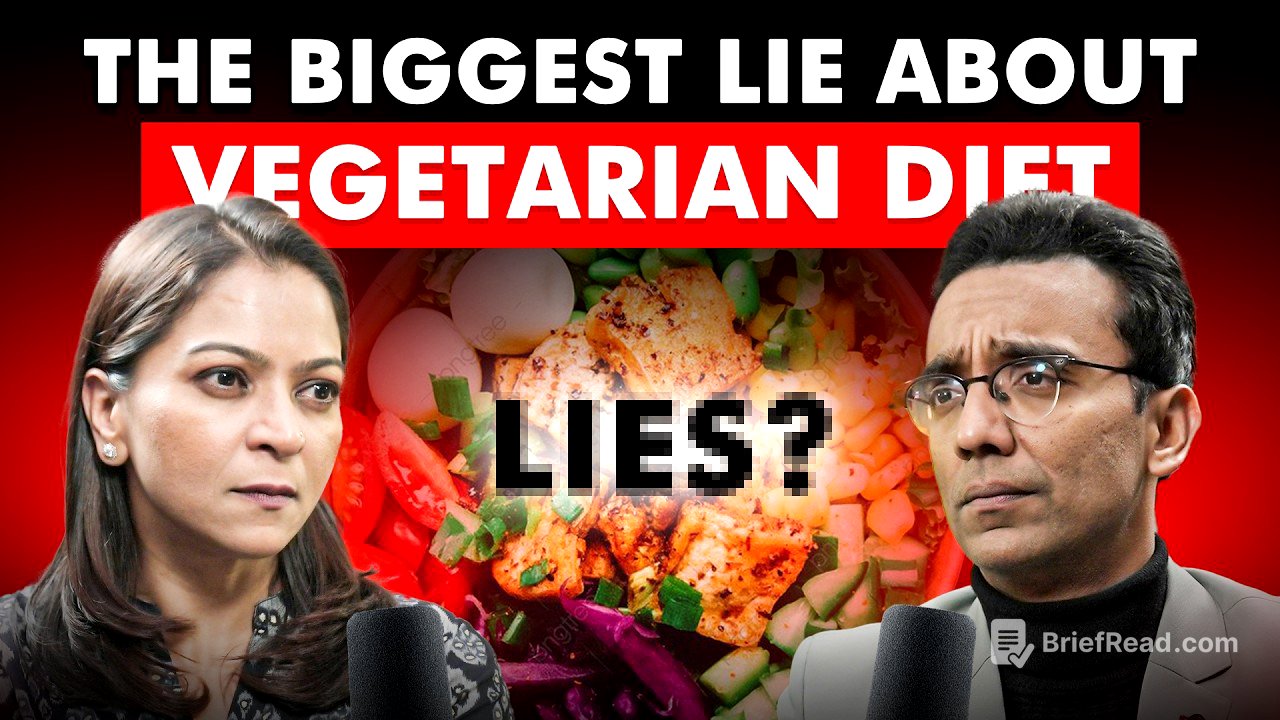TLDR;
This podcast features Dr. Pal and nutritionist Sangita, discussing practical approaches to diet and nutrition, particularly for Indian vegetarians and those with diabetes or IBS. They stress the importance of prioritizing protein and healthy fats, understanding the limitations of plant-based proteins, and making mindful food choices to improve overall health and well-being. They also touch upon mindful eating, the impact of modern lifestyles on gut health, and the benefits of intermittent fasting.
- Prioritize protein and healthy fats in your diet.
- Be mindful of the carbohydrate content in your meals.
- Understand the difference between class one and class two proteins.
- Make informed choices about fats and oils, avoiding excessive seed oils.
- Practice mindful eating and address lifestyle factors affecting gut health.
Intro [0:00]
Dr. Pal introduces the podcast, mentioning that the discussion aims to provide nutritional advice applicable from both clinical and nutritional perspectives. The goal is to find common ground and effective strategies for improving health through diet.
Evaluating My Patients' Cases: How Diet Changes Can Improve Health [2:53]
Dr. Pal presents a patient case of a diabetic with gastroparesis (stomach paralysis due to nerve damage from high blood sugar). The patient experiences epigastric pain, nausea, and vomiting, with endoscopy revealing retained food in the stomach even after fasting. Dr. Pal emphasizes the need to lower the patient's A1C levels to 5.7 and seeks Sangita's advice on how to approach the nutritional aspect of the patient's care. Sangita suggests starting by identifying what's missing in the diet, typically healthy protein and fat, rather than immediately focusing on carbohydrate reduction.
80% Diet & 20% Physical Activity [12:04]
Dr. Pal agrees with Sangita's approach, stating that in his practice, they work as a team with GI dietitians. He believes that diet is 80% of the solution, while physical activity accounts for 20%. If one can't do both, starting with diet is crucial.
Unhealthy Diet: How It Leads to Pre-diabetes and Diabetes [12:42]
Dr. Pal presents another patient scenario: a person with uncontrolled diabetes on Metformin, whose A1C levels have slowly increased, leading to nerve damage. He also mentions new-onset diabetes and pre-diabetes cases. He explains the pathophysiology of insulin resistance, emphasizing the importance of time-restricted feeding and reducing carbohydrate intake to allow insulin to function effectively.
Protein Deficiency in Indians (Veg Vs Non-Veg Diet Debate) [14:57]
Dr. Pal shares his research showing that the average protein intake among vegetarian Indian patients is only 40 grams per day, while they need around 70 grams. Sangita adds that her sample size showed even lower intake, around 30 grams. They discuss that while BMI might appear normal, it's often misleading for Indians, who should ideally have a lower BMI. The main challenge is educating patients about protein sources and amounts. Sangita explains that in her consultations, she educates vegetarians on class one (animal-based) and class two (plant-based) proteins, debunking myths about sources like dal being complete proteins.
The Problem with the Vegan Diet [21:55]
Sangita explains the challenges of hitting protein targets on a whole food, plant-based (vegan) diet. To reach 70g of protein, one might need to consume excessive calories and still face issues with bioavailability. She notes that many vegetarian bodybuilders supplement with whey or processed plant proteins to meet their nutritional needs efficiently.
Lactose Intolerance Issues: What You Need to Know [26:21]
Dr. Pal and Sangita discuss the increasing prevalence of lactose intolerance, especially among immigrant populations and South Indians. Dr. Pal shares an anecdote about a cardiologist friend who experienced bloating until he eliminated filter coffee with milk. Sangita suggests that ancestry and topography might play a role in lactose intolerance.
The Importance of Including Protein in Your Diet [31:34]
Sangita suggests paneer and curd as dairy options that South Indians can often handle. She explains how to make curd more protein-efficient by draining it using a muslin cloth. Greek yogurt is also recommended, with a caution against flavored varieties due to added sugars. She urges people not to fear whey protein supplements and advises consulting experts for the right sources. Tofu and tempeh are mentioned as good protein sources, especially for those outside India.
Do You Eat Soya Chaap? Watch This Video Before Your Next Meal! [34:24]
Sangita advises against soya chunks due to their high processing and lack of fermentation, which can cause gastric issues. She warns against soya chaap, a popular Indian vegetarian option, as it is often made with vegetable oil and maida, making it unhealthy.
Pulses & Legumes: Why They Make You Feel Bloated or Constipated [37:36]
Sangita emphasizes that after primary protein sources, one should focus on fiber, vegetables, and fruits before grains. She notes that many people don't digest legumes well, leading to bloating and digestive issues. Dr. Pal explains that this is often due to poor small intestinal motility, where stagnant food leads to bacterial overgrowth and gas production.
Do This If You Have IBS Symptoms: Essential Tips for Relief [42:53]
Dr. Pal shares that the treatment for irritable bowel syndrome (IBS) often involves a low-FODMAP diet, which excludes lentils, legumes, and dals. He emphasizes that the issue isn't the inherent nature of these foods but rather the overall abuse of the gut. Sangita adds that if the gut microbiome isn't developed properly from a young age, it can lead to various digestive issues.
What Happens to Your Body When You Eat Enough Protein? [48:15]
Sangita explains that after 8-10 days of adequate protein intake, people often report feeling less hungry, which is a good sign. She references the concept of protein leverage, where humans eat until they meet their protein requirement, leading to increased energy consumption from other macronutrients when protein intake is low. She also addresses the challenge of carbohydrates being the primary delivery vehicle for other foods in Indian cuisine.
The Problem with the Indian Diet [56:43]
Sangita highlights that the Indian diet often consists of a mountain of rice or rotis with a small amount of dal and subzi, with grains being the hero of the meal. She emphasizes that this should be reversed for proper nutrition. She also notes that many Indians have fatty liver, high insulin, and dyslipidemia, often due to excessive consumption of refined carbohydrates and fried foods.
Busting Ghee & Cooking Oil Myths [1:00:13]
Sangita and Dr. Pal discuss myths around ghee and cooking oils. Sangita clarifies that LDL isn't high because of ghee but because of fried foods. She emphasizes that all oils are rich in calories and that the problem is the overall consumption of fat, especially from ultra-processed foods. She advises rotating fats and not fearing saturated fats from traditional sources like ghee and butter.
Importance of Eating Nuts & Seeds for Your Health [1:12:20]
Sangita discusses the importance of nuts and seeds, emphasizing that they should be part of a balanced diet. She advises watching the quantity of nuts if weight loss is the goal, as they can be overeaten. She suggests using seed mixes as a topping on vegetables or Greek yogurt for healthy snacking.
Mindful Eating Vs Forced Diet! [1:13:03]
N/A
The Problem with Eating Out and Ordering Food Online [1:17:21]
Sangita and Dr. Pal discuss the high frequency of ordering food online, especially among young software professionals. They emphasize the importance of reducing such orders and making mindful choices when eating out, such as avoiding deep-fried dishes.
Hydrating Your Body, Afternoon Snacking & Intermittent Fasting Benefits Explained! [1:26:41]
Sangita discusses the importance of hydration and offers healthier snacking options. She emphasizes the benefits of intermittent fasting as a sustainable option for busy professionals. Dr. Pal adds that fasting helps rest the insulin and promotes better sleep.
Fasting: The New Meditation for Wellness [1:38:00]
Dr. Pal compares fasting to meditation, emphasizing that it's about being comfortable with discomfort and handling cravings. He notes that fasting can help reset one's relationship with hunger and improve mental resilience. He shares his prescription for GI patients: eat by 7 PM, sleep for 8 hours, and avoid going to bed for 3 hours after the last meal.
Thank you for watching the entire podcast! [1:46:34]
Dr. Pal thanks the audience and encourages them to implement the discussed techniques in their daily lifestyle. He promotes the podcast's YouTube and Spotify channels, encouraging viewers to subscribe and support the content.









